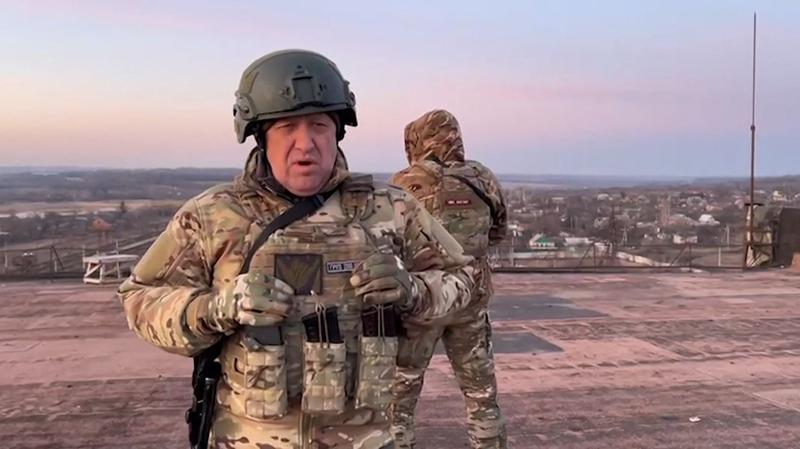
For years, Wagner’s paramilitary group was considered Moscow’s armed wing abroad, particularly in Syria and several African countries. That status may have to be revised following its leader’s uprising in Russia, according to an AFP analysis.
After a spectacular coup that brought him 400 kilometers from Moscow before he surrendered, Yevgeny Prigozhin should, in principle, have gone into exile in Belarus, an ally of Moscow, and forged a new relationship with President Vladimir Putin.
But what about its operations in foreign theaters of war, where a private paramilitary group succeeds in exploiting local wealth, protecting governments, information warfare, and brutal military operations?
“The biggest impact of this event can be felt in the Middle East and Africa,” Rob Lee of the Institute for Foreign Policy Studies said on Twitter, noting that a “short-term compromise” is different from a “long-term solution.” .
Did Prigozhin and Putin communicate? Interdependence
It is obvious that Prigozhin and Putin should have discussed this issue before reaching an agreement. Abroad, Wagner is heavily dependent on the Russian Ministry of Defense, which supplies him with troops, equipment and weapons for his theaters of operations. And Moscow needs Wagner to maintain its influence in these troubled regions, where it wants to denigrate Western influence.
In addition, the group provides significant revenue by supplying “gold and minerals from Sudan, the Central African Republic and Mali that Putin needs to support his economy,” a European military source said.
In Syria, according to the Syrian Observatory for Human Rights (OSHR), Wagner’s mercenaries – Russian, ex-Soviet and Syrian – have been operating as “special forces” on the ground alongside the Kremlin’s army since 2015. Now they are present in small numbers near oil wells and in the provinces of Hama and Latakia (central-western Syria).
In Africa, they were found in Libya, Sudan and Mozambique. And they are on the front lines in Mali and the Central African Republic (CAR), where Wagner’s boss oversees the security of President Faustin-Archangel Touader.
On Monday, Moscow tried to dispel doubts by assuring that PVK “Wagner” will continue to work in these two countries. There, “Wagnerians” work as “instructors”. “Of course, this activity will continue,” as will their mission “to ensure the safety of their leaders,” Russian Foreign Minister Sergey Lavrov told RT.
The minister also assured that the weekend episode will not change anything in Russia’s relations with its African allies.

Evgeny Prigozhin, mercenary leader of the Russian group Wagner Photo: AFP / AFP / Profimedia
“We signed with Russia”
The Central African Republic “signed (not in 2018) a defense agreement with the Russian Federation, not with Wagner,” Fidel Guandjika, a special adviser to the president, told AFP. “Russia subcontracted with Wagner, if Russia no longer agrees with Wagner, they will send us a new contingent.”
In February, an independent UN human rights expert in the Central African Republic accused the army and its Russian allies of abuses. The European Union then announced new sanctions against Wagner, targeting several of his senior officials in the country.
And on Friday, French President Emmanuel Macron accused Russia of being “a force that destabilizes Africa through private armed groups that dominate and commit abuses against civilians.”
Sergey Lavrov clarified the situation
What happens next will depend on the negotiations between Putin and Prigozhin through Belarusian President Alexander Lukashenko.
“There was a wait-and-see attitude in Bangui (not the capital of the PRC) until Sergey Lavrov clarified the situation. But it is difficult to imagine how a change in the hierarchy in the Russian apparatus and Wagner’s position in it can take place without extremely high tension on the ground,” emphasizes Maxim Odine from the Institute for Strategic Studies of the Military School (IRSEM) from Paris.
“I can’t imagine that Prigozhin and some of his people would allow themselves to be pushed from behind and give up their role. Delegating entire spheres of sovereign power to Wagner to act where the Russian state did not want to interfere gave this player much more room for maneuver than he expected,” emphasized experts consulted by AFP.
In recent years, Prigozhin’s network has become the dominant player in the Russian presence in sub-Saharan Africa. The delicate balance between Russian state and non-state actors on the continent is likely to undergo major upheaval.
Thus, it takes some time for the fog to clear completely.
Read also:
- Yevgeny Prigozhin’s first message after the failed uprising in Russia / What he says about the role of the leader of Belarus, Alexander Lukashenko
Source: Hot News
James Springer is a renowned author and opinion writer, known for his bold and thought-provoking articles on a wide range of topics. He currently works as a writer at 247 news reel, where he uses his unique voice and sharp wit to offer fresh perspectives on current events. His articles are widely read and shared and has earned him a reputation as a talented and insightful writer.